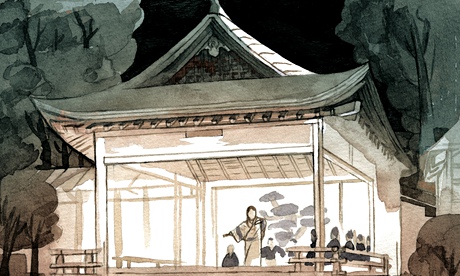
Yumiko is a young Japanese woman who has made London her home. When she first arrived years ago, she found the city harsh; the air seemed often to be thick with tension. But it was exciting, too, all the different lives and cultures, its astonishing "openness", and slowly she carved out her own space within it. These days, she runs a successful design company and is engaged to a wry but loving Englishman called Mark (though she has not yet told her parents this news, knowing it will mean the end of their hopes for her return). Only then… the phone rings. Her father, a keen mountaineer, has been killed in an accident after falling 60ft. She must go home for the funeral.
In Japan, everything should be so familiar. But she feels at a distance. Japanese funerals are replete with ceremony, rituals she considers with the eye of an exile, and cannot help but find wanting. She hates the funeral "package" her family must buy – it appals her that a kaimyo, a holy name conferred on the dead by a Buddhist monk, counts as an extra – and as the chanting begins she finds that she cannot cry. The whole performance reminds her of the Noh play she saw during her last visit to the country; the ghastly modern funeral home is a stage, and she is an actor, courtesy and formality filling the space where grief should be. It's only when she reaches into her father's open coffin and touches his face that she is able to feel anything at all, and now it's partly guilt that has her making a spectacle of herself (her family gaze on, startled by her sudden sobbing). Her father had wanted nothing more than for her to marry a nice Japanese boy and settle down in Tokyo.
Fumio Obata is a Japanese exile himself – he came to Britain in 1991 to study illustration at Glasgow School of Art and never left – and perhaps this is one reason why his fantastic graphic novel Just So Happens feels so richly intimate; he knows all about the conflict of belonging. But it's clear, too, that he is a talent to watch. I like his elegant, understated drawings, which hint at the manga stories he must have read as a boy. Bullet trains, Shinto temples, shopping malls, sushi restaurants: he does them all beautifully.
His storytelling, too, is crazily accomplished, flashback deployed with great care the better to reveal Yumiko's state of mind (in comics, flashback can often feel clunky). Most of all, I like the book's message, which is about talent and fulfilment, and the way that thwartedness helps no one. After the funeral, Yumiko travels to Kyoto to see her mother (her parents divorced when she was a teenager), who has always thrilled at her daughter's new life of possibility, roundedness and ambition. And here, something clarifies for her at last. She returns to London liberated from a burden she had not even known she was carrying. Her father's death has, it seems, set her free, not from marriage and Japanese conformity but from her mother's need to live vicariously through her. Obata's final frame is a sketch of Regent Street beneath grey skies, a taxi nosing its way determinedly towards Piccadilly Circus. For all its bustle, it feels strangely peaceful.

